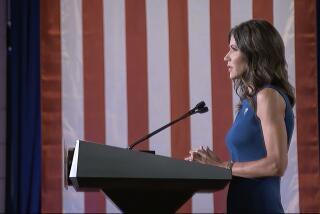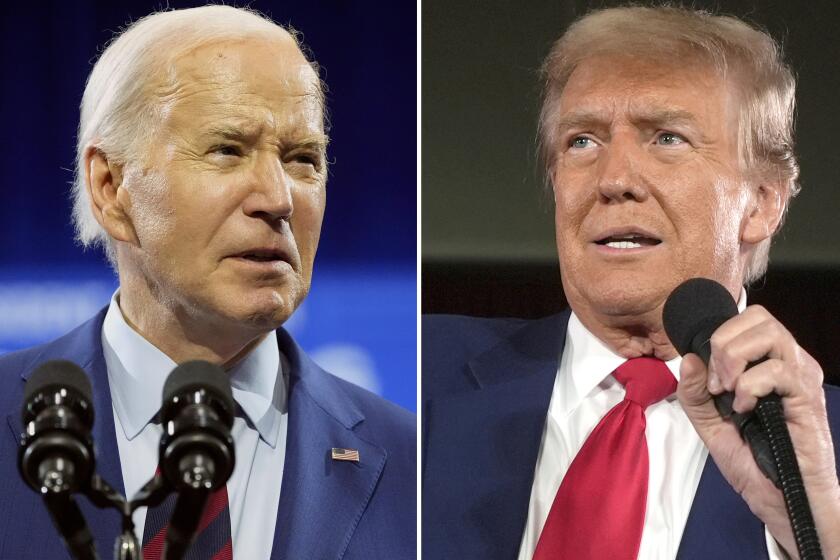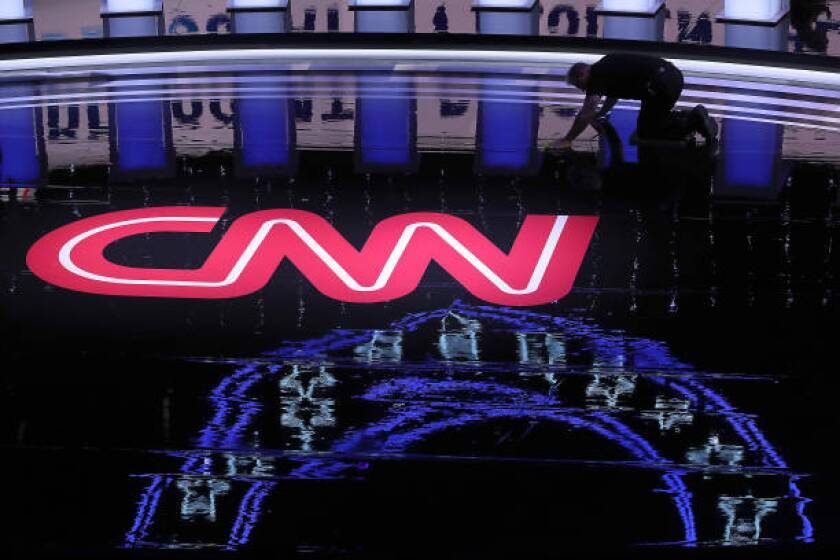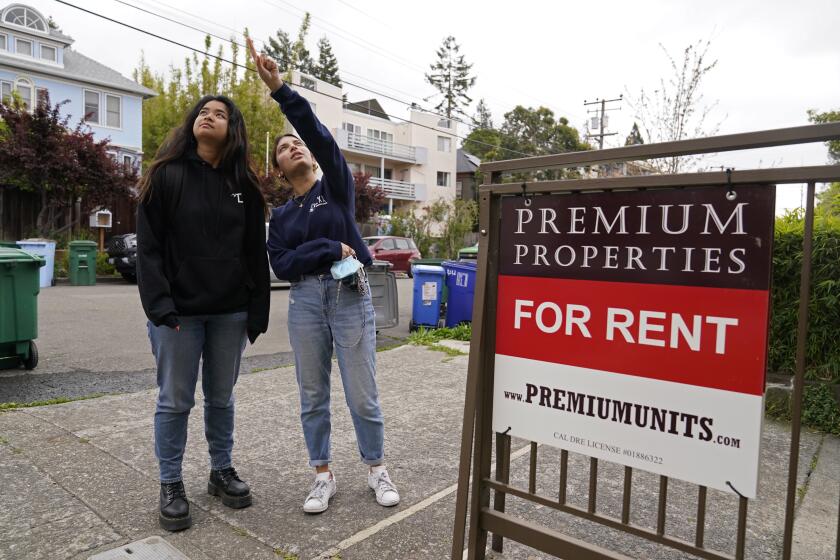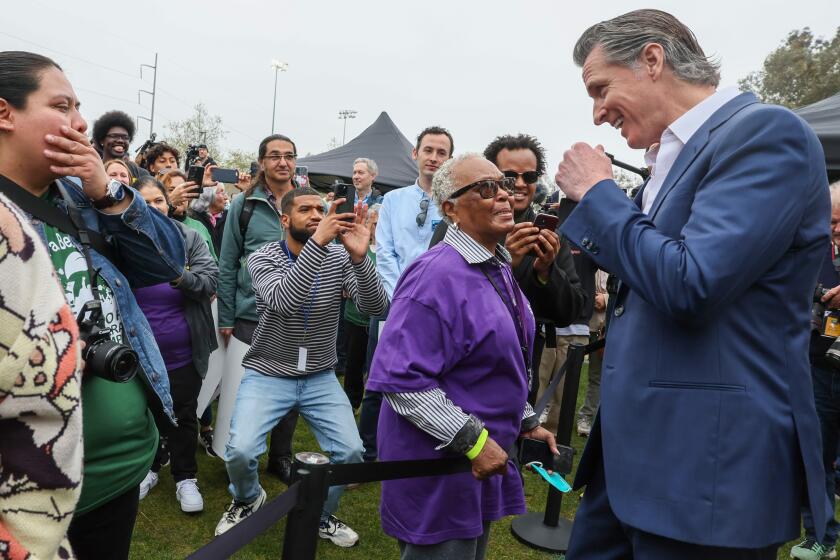THE MEDIA : Campaign Roller Coaster Ends as It Began--Dole in Charge : Although many journalists are praised for tackling complex issues, some feel embarrassed by the bumpy ride. The profession’s tendency to prognosticate draws criticism.
For the national political media, the first 10 weeks of this year’s presidential campaign had all the speed and unpredictability of a roller coaster. But like any good carnival ride, this one ended where it started--with Senate Majority Leader Bob Dole looking like a sure thing for the Republican nomination.
There was some excitement along the way, of course. When Steve Forbes surged in the polls, some pundits predicted a political liftoff. When Dole slid downward, many prognosticators prepared for an oncoming crash.
For the record:
12:00 a.m. March 20, 1996 For the Record
Los Angeles Times Wednesday March 20, 1996 Home Edition Part A Page 3 Metro Desk 1 inches; 35 words Type of Material: Correction
Hotline newsletter--A Times article on March 16 incorrectly referred to Bob Balkin as managing editor of the Hotline, a daily electronic newsletter that digests political coverage from around the country. He is the publisher and editor in chief.
A Forbes downturn in Iowa--he was declared defunct. A win by Patrick J. Buchanan in New Hampshire--yikes, get us rewrite. Another jolt when Forbes won Arizona. But then, back to earth as Dole harvested more delegates every week.
Still, the bumpy ride has more than a few veteran journalists feeling a little sheepish about all the fuss.
“Perhaps there is a special little corner of hell reserved for journalists, where those of us from the electronic media will be forced to watch and listen to an endless loop of our own inaccurate analyses and projections,” Ted Koppel said recently on his ABC-TV “Nightline” program.
Lest the newspaper and magazine crowd feel too superior, he added: “To our colleagues from the print media, it will look something like this: The recent parade of gloomy headlines about Bob Dole--’Doubts About Dole’; ‘Dead Man Walking’; ‘Dole Has Dug Himself a Hole, Can He Climb Out?’ ”
*
Or as CBS News correspondent Eric Engberg put it: “If you go through the columns from some of the pundits three weeks ago, you find yourself, well, just laughing.”
Of course, not everything the media did this time was wrong. Kathleen Hall Jamieson, dean of the Annenberg School for Communication in Philadelphia, praises many journalists for “tackling some complex issues,” mainly the flat tax, trade issues and job insecurity.
And some media outlets, particularly Associated Press, the Concord Monitor and CNN, earned compliments from Jamieson and others for their quick and thorough analyses of campaign ads. In particular, those three organizations were “terrific” at quickly sorting out truth or even hyperbole from political distortions, she said.
But other media analysts, as well as some media members, have wondered why there has been so much coverage of the candidate horse race, so much dependence on polls, such a tendency to make yesterday’s or even today’s moment more important than the historical context.
And mainly, why do so many journalists find it necessary to predict the outcome of a primary days before the vote, or even make early calls about the entire race and thus take a walloping big chance of getting it wrong?
“I don’t understand it,” said Bob Balkin, managing editor of the Hotline, the daily political newsletter that records many of the media’s statements, including most of this year’s bloopers.
“If it’s such a big story, why do you have to call the race as soon as possible?” he said. “If you really want to sell soap, why not string it out as long as you can? To predict--it is part of some weird tribalism among journalists.”
The ebb and flow of Forbes’ fortunes proved particularly elusive for the press in this bizarre primary season. A political novice aiming for the top political job, Forbes was barely mentioned when he first began running last September. Then, with his self-financed advertising campaign, Forbes suddenly began threatening Dole in the preprimary polls and sending the media scrambling to explain why. In late January, when Forbes was still riding high, CBS correspondent Phil Jones reported: “Forbes says he is a Ronald Reagan kind of Republican. So far, like Reagan, he appears to be Teflon-coated.”
Anchorman Bernard Shaw opined on CNN: “Conventional wisdom claimed Steve Forbes had about as much chance of winning the Republican presidential nod as a snowball in hell. Well, that snowball is on a roll.”
On Feb. 12, Forbes finished fourth in the Iowa caucuses. He did no better on Feb. 20 in New Hampshire. Very quickly, a few pundits began the last rites.
“I think he’s dead, politically that is,” ABC-TV’s Cokie Roberts said on “Night-line.” A few days later, Forbes won the Delaware and Arizona primaries.
“The press so far has been hyperbolic, hysterical and just plain wrong. So what else is new?” said Paul Costello, a longtime political consultant who is sitting out this year’s campaign as vice president of HBO. “Why couldn’t they just stand there in New Hampshire and say, ‘It’s too early. It’s too soon to tell. I don’t know yet.’ ”
*
In fact, many journalists did suggest that what you saw in the New Hampshire, Iowa and Arizona contests in February was not what you were going to get at the Republican convention in August. But others succumbed to what they believe is the public’s demand for predictions from them. Meteorologists predict weather, so why can’t political analysts predict elections?
While most veteran pundits have learned to have plenty of hedge in any political preview, even some of the nation’s most prestigious have found themselves stuck with predictions that have turned out to be off base.
Here are a few of the pronouncements that missed the mark (to be fair, these same journalists have been correct on numerous other occasions):
* David Nyhan of the Boston Globe said before the New Hampshire primary that Dole was “coming down like an ancient fir on the backside of Mt. Washington.”
* Business Week, in its issue dated March 4, wrote: “Civil War? A back-room deal for the vice presidency? Brokered convention? Can this be the same GOP that thundered to majority status in the 1994 election? Unfortunately for Republicans the answer is yes.”
* A few days after Buchanan won the New Hampshire primary--and a few days before he lost in Arizona--conservative commentator Mona Charen said on CNN: “Buchanan has now placed himself in the position where he has the capacity to change the direction of the whole Republican Party.”
* Tim Russert, the host of NBC-TV’s “Meet the Press,” said late last month: “The Bob Dole campaign is in trouble. My guess is: Arizona, he now is going to be second to Pat Buchanan.” The next day, Dole did finish second--with Forbes first and Buchanan third.
* Even a simple event like a news conference scheduled by Forbes prompted CNN to predict that he was pulling out of the race on the eve of the March 7 New York primary. As it turned out, Forbes called the event to announce that Jack Kemp was endorsing him.
For a brief period, some media members even began to discuss out loud the possibility of a brokered convention--long a dream of many journalists frustrated by nominating gatherings that have become long on theater and short on real news.
“That was a dream. There was never going to be a contested convention, even though people were talking about it, not only in the saloon but also in public,” said Jon Margolis of the Chicago Tribune.
At one point in the turmoil, Doyle McManus, Washington bureau chief of the Los Angeles Times, raised the possibility of a brokered nominating process. “Buchanan is going to go into the convention with more delegates than anyone else,” he said on a television talk show. “The problem is, there’s going to be three other people.”
“I regretted it almost instantly,” McManus said this week, noting that the urge to predict has a strong pull over most journalists. “Really, the only truthful answer is, ‘I don’t have the faintest idea.’ But even after you’ve said that to people, they desperately yearn for a prediction from you.”
*
Margolis recalled that several years ago, he was asked on a television talk show how a particular candidate was doing in the upcoming election. “I told them, ‘I don’t know and none of us knows and there’s no reason to pretend that we know,’ ” he said. “They never invited me back.”
More to Read
Get the L.A. Times Politics newsletter
Deeply reported insights into legislation, politics and policy from Sacramento, Washington and beyond. In your inbox three times per week.
You may occasionally receive promotional content from the Los Angeles Times.
